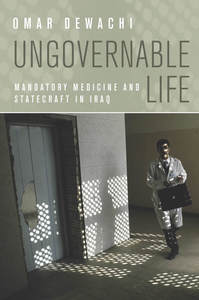Dewachi, O. (2017) Ungovernable Life Mandatory Medicine and Statecraft in Iraq, Stanford University Press.
Link: https://www.sup.org/books/title/?id=22595
Abstract
Iraq's healthcare has been on the edge of collapse since the 1990s. Once the leading hub of scientific and medical training in the Middle East, Iraq's political and medical infrastructure has been undermined by decades of U.S.-led sanctions and invasions. Since the British Mandate, Iraqi governments had invested in cultivating Iraq's medical doctors as agents of statecraft and fostered connections to scientists abroad. In recent years, this has been reversed as thousands of Iraqi doctors have left the country in search of security and careers abroad. Ungovernable Life presents the untold story of the rise and fall of Iraqi "mandatory medicine"—and of the destruction of Iraq itself.
Trained as a doctor in Baghdad, Omar Dewachi writes a medical history of Iraq, offering readers a compelling exploration of state-making and dissolution in the Middle East. His work illustrates how imperial modes of governance, from the British Mandate to the U.S. interventions, have been contested, maintained, and unraveled through medicine and healthcare. In tracing the role of doctors as agents of state-making, he challenges common accounts of Iraq's alleged political unruliness and ungovernability, bringing forth a deeper understanding of how medicine and power shape life and how decades of war and sanctions dismember projects of state-making.
About the author
Omar Dewachi is Assistant Professor of Anthropology, Social Medicine, and Global Health and Co-Director of the Conflict Medicine Program at the American University of Beirut.
